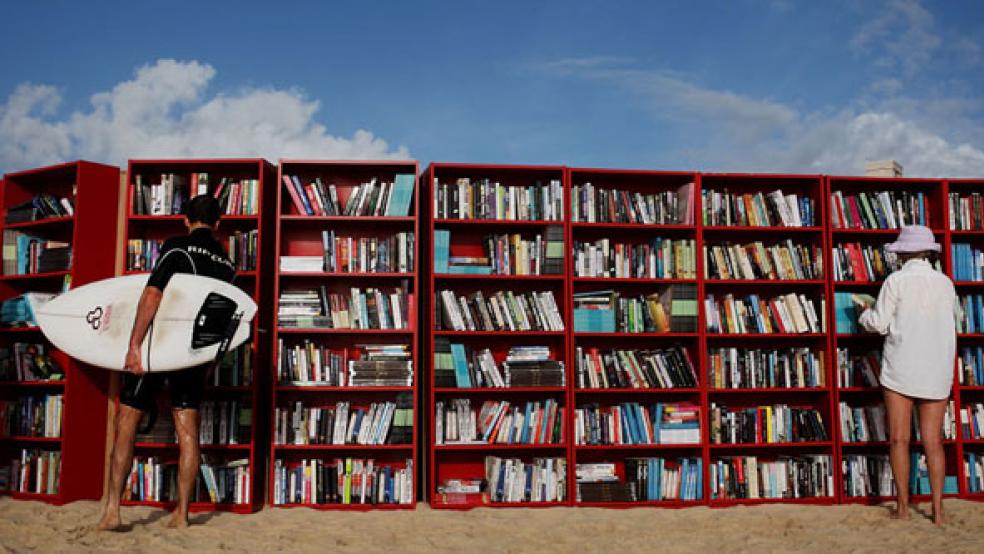Unless you’ve been living under a rock, you know that this is the summer that you’ll be able to finally read Harper Lee’s kinda-sorta sequel to “To Kill A Mockingbird.” Entitled “Go Set a Watchman” the novel already is smashing records for pre-orders and, in spite of the controversy associated with it, booksellers are gearing up to surround its debut with lots of publicity.
This also will be the summer of Elena Ferrante. The final novel in her Neapolitan series, “The Story of the Lost Child,” will arrive in readers’ hands around Labor Day (which gives those who haven’t discovered this author just enough time to read through the three earlier books in the series.)
Related: 13 Movies You Should See This Summer
Ferrante’s story is even more piquant than that of Harper Lee; nobody knows precisely who she is. The reclusive author has refused to promote her books, will provide only written answers to questions from journalists, won’t accept awards or attend writer’s conferences. Her books, she argues, should speak for themselves. That ruthless preservation of her anonymity, combined with Ferrante’s elegant prose style and her almost confessional approach to storytelling, have made her a cult favorite; the line to acquire one of 200 advance copies of “The Story of the Lost Child” from her publishers, Europa, at BookExpo last month rivaled those for, say, Gloria Steinem — and many went away disappointed.
Other books are arriving in stores this summer that are worth grabbing and taking away with you on vacation — books that aren’t going to attract the same kind of marketing budget or critical hullabaloo. Below, a list of a half-dozen novels and short story collections that don’t necessarily have lots of buzz, but you simply shouldn’t overlook among all the blockbusters, even if you have to venture past the big displays at the front of the bookstore to locate them. It will be worth the effort.
“Mayumi and the Sea of Happiness” by Jennifer Tseng
If Ferrante’s novels succeed in bringing more attention to the others from her U.S. publisher, Europa Editions, I’ll be delighted. This debut novel by an established poet is one example of why. Tseng’s tale of a love affair between a 41-year-old woman and the son of her friend could be trite, but is incredibly moving, lyrical and poignant. (Europa Editions; May 2015; $16.00)
“The Fall of Princes” by Robert Goolrick
The pundits are comparing this novel, set in Manhattan and Wall Street during the 1980s and dealing wit the aftermath of a financial boom-and-bust cycle, to Tom Wolfe’s “Bonfire of the Vanities.” I actually enjoyed reading this far more, perhaps because Goolrick’s tone is less knowing and satirical. It’s a smart but more reflective novel, and it arrives at just the right point in time for those pondering questions about income inequality and the like. Oh, and it’s also beautifully written. An early candidate for favorite novel of the year. (Algonquin; August 2015; $25.95)
“Music for Wartime” by Rebecca Makkai
Sometimes magical (a miniature Johann Sebastian Bach travels through time to climb out of one character’s upright piano in a modern-day New York apartment and grows to human size before shrinking again when confronted with the modern world), these stories are gems. They are smart and beautiful; the language itself feels musical and, as the title suggests, music often emerges as a plot element or theme. Trying to read just one of these stories is like trying to consume a single chocolate from a box; it can’t be done. (Viking/Penguin; July 2015; $26.95)
“Land Where I Flee” by Prajwal Parajuly
A favorite collection of short stories from last year was “The Gurkha’s Daughter” by Prajwal Parajuly, all revolving around characters from the Nepalese diaspora in Bhutan, India, and New York. That collection was shortlisted for the Dylan Thomas Prize. Parajuly has followed up with an equally impressive novel set in Sikkim, in northeastern India — and that culture’s version of the extended family reunion from hell. The plot sounds conventional enough, but the characters and Parajuly’s deft writing and wry character portraits are anything but. Not to be missed. (Quercus; June 2015; $22.99)
“The Jazz Palace” by Mary Morris
Sometimes when a novelist tries to write about music, he or she just nails it. Thomas Mann did in “The Magic Mountain.” So does Mary Morris in “The Jazz Palace,” set in a Chicago giving birth to the blues and to jazz — and to bootleggers and organized crime — in the early 20th century. At the novel’s heart is a group of American outsiders of sorts. All the drama of an era that has passed by is captured in the novel’s pages. (Nan A. Talese/Doubleday; April 2015; $25.95)
“Best Boy” by Eli Gottlieb
It’s a rare novel for adults that takes us inside the mind of someone dealing with some kind of mental deficiency or altered perception — last year’s impressive “Elizabeth is Missing” by Emma Healey, a novel of psychological suspense written through the eyes of a woman suffering from Alzheimer’s disease, is the only one of its kind that I can recall. Here, Eli Gottlieb, who won the Rome Prize for his previous novel, has a middle-aged man with autism narrate his own tale of how upheavals to his world unsettle him. Ultimately, the precision of Gottlieb’s vision and his narrative voice, combined with his character’s unusual insights, is likely to leave the reader questioning their certainties. (Liveright/W.W.Norton; August 2015; $24.95)
By all means, don’t miss Ferrante’s latest, or Harper Lee. Or your favorite blockbuster by James Patterson, or new thrillers or beach reads. But if you’re in the mood for something different — something smart and interesting — these are the summer reads to seek out.
Top Reads from The Fiscal Times:






